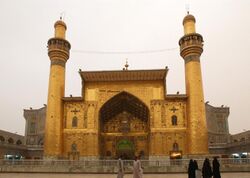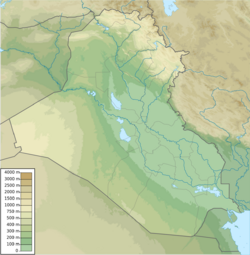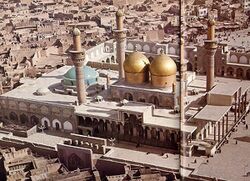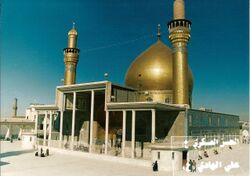Place:Al-Atabat Al-Aliyat
Najaf نَجَف an-Najaf اَلـنَّـجَـف | |
|---|---|
 Masjid al-Imam ‘Ali, one of the most important sites of Najaf | |
| Coordinates: [ ⚑ ] 32°00′00″N 44°20′00″E / 32°N 44.3333333°E | |
| Country | |
| Province | Najaf Governorate |
Al-Atabat Al-Aliyat (Arabic: العتبات العالیات[1][2] lit. sublime thresholds)[3][4] Al-Atabat Al-Aliyat, which is also known as Al-Atabat Al-Muqaddasa (literally: holy doorsteps) are the shrines of six Shia Imams which are in four cities of Iraq, namely Najaf, Karbala, Kadhimiya and Samarra;[5][6][7] and actually the whole of these Imams' shrines (graves) are called Atabat Aliyat.[8] The mentioned cities have significance due to shrines of those six Shia Imams who have been buried there.[9]
Najaf
Najaf is a city in central Iraq about 160 km (roughly 100 miles) south of Baghdad. Its estimated population in 2013 was 1,000,000 people.
Najaf (city) is the capital of Najaf Governorate. It is widely considered the third holiest city of Shi'a Islam, the Shia world’s spiritual capital and the center of Shi'a political power in Iraq.[10][11] Ali ibn Abi Talib's shrine is there[12] as a part of Atabat Aliyat.[13][14]
Karbala
Karbala is a city in Iraq,[15][16] that is considered as the place of happening Ashura event. The most significant shrines/graves of Karbala are related to Husayn ibn Ali and Abbas ibn Ali's shrine. There are also the graves of Husayn's son (Ali Akbar) and his other companions in his shrine.[17]
Kadhimiya
Kadhimiyyah or al-Kazimain is located tigris bank where is toward Baghdad as the capital of Iraq. There are the shrines of Musa al-Kadhim (the 7th Imam of Shia Islam) and Muhammad al-Jawad (as the 9th Imam of Shia Islam) in this city.[18]
Samarra
Samarra is a city in Iraq where stands on the north of Baghdad. The tenth Imam of Shia (Al-Hadi) and the eleventh Imam of Shia (Hassan Askari) are buried there,[19] and it is regarded as one of Atabat Aliyat destinations.[20][21]
See also
- Battle of Karbala
- Family tree of Muhammad#Family tree linking prophets to Imams
- List of casualties in Husayn's army at the Battle of Karbala
- Sayyid
- Arbaʽeen Pilgrimage
References
- ↑ Kadhimiyah hawzah.net Retrieved 3 June 2018
- ↑ Al-Atabat Al-Aliyat yjc.ir Retrieved 3 June 2018
- ↑ Money, Religion, and Politics: The Oudh Bequest in Najaf and Karbala', 1850-1903 Retrieved 28 October 2021
- ↑ The Sunna and Shi'a in history, Ofra Bengio and Meir Litvak, P. 88
- ↑ ArabKhani, Atabat Aliyat in Iran & Uthmani relationship (19th century), P. 23
- ↑ Atabat-i Aliyat in Iran-Ottoman Relations in The Nineteenth Century (in Persian) academia.edu Retrieved 3 June 2018
- ↑ Report image gitionline.ir Retrieved 3 June 2018
- ↑ Atabat Aliyat tasnimnews.com Retrieved 8 June2018
- ↑ ArabKhani, Atabat Aliyat in Iran & Uthmani relationship (19th century), P. 23
- ↑ Hundred women will preach the teachings of Islam during the walk from Najaf to Karbala en.shabestan.ir Retrieved 4 June 2018
- ↑ Al Najaf Intl en.hellowings.com Retrieved 4 June 2018
- ↑ History of the shrine of Imam Ali ibn Abi Talib, peace be upon him al-islam.org
- ↑ Najaf (Atabat Aliyat) farsnews.com
- ↑ Atabat Aliyat isna.ir
- ↑ Karbala al-islam.org Retrieved 5 June 2018
- ↑ The Route of Imam Husayn from Makkah to Karbala al-islam.org Retrieved 5 June 2018
- ↑ ArabKhani, Atabat Aliyat in Iran & Uthmani relationship (19th century), P. 23
- ↑ ArabKhani, Atabat Aliyat in Iran & Uthmani relationship (19th century), P. 32
- ↑ ArabKhani, Atabat Aliyat in Iran & Uthmani relationship (19th century), p. 34–36
- ↑ Samarra – Atabat Aliyat yjc.ir Retrieved 6 June 2018
- ↑ Atabat Aliyat, Samarra tasnimnews.com Retrieved 6 June 2018





